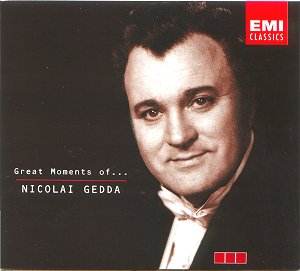Collection: Great Moments of…NICOLAI GEDDA (b.1925)
EMI CMS5 67445 2 Mono/Stereo 3 CDs
Crotchet
Amazon
UK £15.99

CD 1 contains arias from:-
Tchaikowsky: Eugene Onegin; Massenet:
Werther and Manon; Bizet
Les Pêcheurs de Perles; Auber
La Muette de Portici; Gounod:
Roméo et Juliette; Ponchielli:
La Gioconda; Verdi:
Rigoletto Flotow: Martha;
Donizetti: L'Elisir D'Amore and La
Favorita Cilea: L'Arlesiana;
Mussorgsky: Boris Godunow
Rimsky-Korsakov: Die Mainacht;
Adam Postiljonen Från
Longjumeau
CD2 contains arias from:-
Rousseau: Le Devin du Village;
Gluck: Orphée et Eurydice;
Mozart: Don Giovanni and Die
Zauberflöte and The Abduction from the Seraglio;
Weber: Oberon;
Flotow: Alessandro Stradella;
Wagner: Lohengrin;
Goldmark: Die Königin von Saba;
Nicolai: Die Lustigen Weiber Von
Windsor
CD3 contains arias from:-
Berlioz: Benvenuto Cellini;
Delibes: Lakmé;
Massenet: Werther; Lalo: Le Roi D'ys
Meyerbeer Les Hugenots;
Rossini: Guillaume Tell;
Bellini: La Sonnambula;
Donizetti Lucia Di Lammermoor and Don
Pasquale -- plus encores:- Lara:
Granada; Rossini: La Danza;
Godard: Berceuse and
Meyer-Helmund: Gute Nacht, mein holdes,
süsse Mädchen
Nicolai Gedda, one of the greatest tenors of the 20th century,
was born in Sweden in 1925. His discography is prodigious, with the catalogues
listing over 100 complete recordings, or highlights of operas, and operettas.
Additionally, there are his solo recitals; sacred music and Lieder and folk
songs (examples of which are promised in subsequent collections).
Gedda was fluent in nine languages, and these excerpts demonstrate his remarkable
clarity of diction in them all. Just listen to his immaculate English and
his perfect control, for instance, in the demanding aria 'Love only love,
can now direct me' from the Bath Festival performance of The Abduction
from the Seraglio conducted by Yehudi Menuhin.
As this collection proves, Gedda was the most versatile of tenors. His talent
encompassed a wide range of musical styles and he was acclaimed for the beauty
of his voice and the rare intelligence with which he used it. His final operatic
appearance was at Covent Garden in 1997 but he still gives occasional recitals.
He appeared many times in premières and first performances as well
as in revivals of forgotten operas.
The earliest item in the collection is of a live recording made during the
1952 run of the Stockholm Royal Opera performance of Adolphe Adam's
Postillon Från Lonjumeau. Here the voice is bright and almost
delicate. Later it would gain in body and resilience without loosing any
of its lightness of intonation that enabled Gedda to tackle the highest peaks
and the trickiest tessitura with such apparent ease. Listen to how he surmounts,
for instance, the challenge of the incredibly high register demanded in Gluck's
Orpheus.
The recordings in this 3-CD collection span the years 1953 to 1974. The earlier
ones are in mono but there is no diminution in the listening experience.
Very many of these excerpts appear on CD for the first time.
I was entranced from beginning to end. It would be invidious to select items
for special mention, nevertheless, I will just mention a few which I particularly
enjoyed. In addition to those already mentioned, from CD1: the beautifully
phrased Lensky's aria from Act II of Tchaikowsky's Eugene Onegin;
the exquisite tenderness of his 'Je crois entendre encore' from Bizet's Les
pècheurs de perles; the sheer bel canto beauty of his 'Cielo e
mart' (Ponchielli's La Gioconda ); and of his grand heroic singing
of the three Boris Godunow arias (Mussorgsky). From CD2: I was impressed
with his fervent 'Dalla sua pace' and 'Il mio tesoro intanto' from Mozart's
Don Giovanni; plus the rapturous beauty of his 'Jungfrau Maria'
from Alessandro Stradella (Flotow); his 'In fernem Land' from Wagner's
Lohengrin; and his 'Horch, die Lerche singt im Hain!' from Otto Nicolia's
Die Lustigen Weiber von Windsor. From: CD3, examples of his great
French Grand Opera performances:- the way he vents his spleen in the darkly
dramatic 'Un autre est son époux! - J' aurais sur ma poitrine' from
Massenet's Werther; the flowing beauty and control in 'Puisqu'on ne
peut pas fléchir ces jalouses gardiennes - Vainement, ma bien-aimée
from Lalo's Le Roi D'ys; and his heroic denial of the charms of the florid
Mady Mesplé in their duet, 'Beauté divine enchantreresse' from
Les Huguenots of Meyerbeer. Then there is his wonderful noble heroic
singing of the demanding aria 'Asilie héréditaire - Amis, amis,
secondez ma vengeance' from Rossini's Guillaume Tell and his
marvellous Bellini and Donizetti duets with the marvellus Mirella Freni.
I would also mention the lovely Berceuse from Godard's Jocelyn in
the sparkling encores that round off this set.
Unhesitatingly recommended. A wonderful operatic experience.
Ian Lace

See review of Gedda's autobiography My Life and
Art
